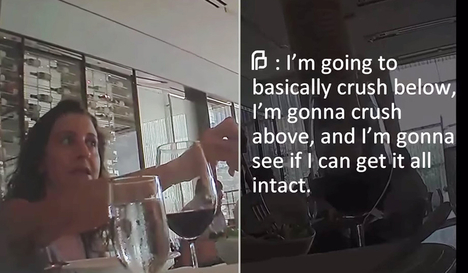 Frame from the undercover video.
Frame from the undercover video.
It's not often that a business-lunch conversation becomes a viral YouTube video. But then, it's not often that a top Planned Parenthood official is recorded discussing, over a leisurely lunch of salad and red wine, the business of selling fetal organs harvested from aborted babies.
More than 2.5 million people have seen the undercover video in which Dr. Deborah Nucatola, Planned Parenthood's senior director of medical services, readily details the ins and outs of harvesting the body parts of aborted fetuses, which are then sold for research. Nucatola thought she was speaking to buyers for a fetal-tissue supply firm in California. In fact, her lunch companions were researchers for the pro-life Center for Medical Progress, which posted the recording online — both the full footage, as well as a nine-minute abridged version.

The video came as a bombshell. Selling fetal organs for profit is illegal under federal law, yet Nucatola appears quite candid in describing Planned Parenthood's lively commercial interest in human tissue from abortion. She is alert to market demand — "I'd say a lot of people want liver," she tells her lunch companions — and understands how to carry out an abortion to maximize the quality of the organs that can be supplied to buyers afterward.
"We've been very good at getting heart, lung, liver because we know that," says Nucatola, "so I'm not gonna crush that part, I'm gonna basically crush below, I'm gonna crush above, and I'm gonna see if I can get it all intact." She talks about properly-trained abortion doctors using ultrasound to ensure that forceps don't damage organs destined for sale. She explains that rotating the fetus so it emerges feet first can make it easier to remove the head and brain undamaged. When she is asked for a "price range," Nucatola replies: "I would say it's probably anywhere from $30 to $100" per specimen, depending on the facility.
Planned Parenthood adamantly insists that it does not traffic in fetal remains. Women who have abortions "sometimes want to donate tissue to scientific research," the organization said in a formal statement, and Planned Parenthood receives "no financial benefit" for facilitating such donations — merely compensation for its "actual costs," which is legal.
As a matter of law, Planned Parenthood may well be on solid ground. Dollars are fungible, but as long as the nation's leading abortion provider formally designates the payments it collects for organs harvested during abortion as reimbursement of expenses, the Nucatola footage offers little indication of a crime or a cover-up.
But it isn't illegality that makes the video so scandalous. It is amorality. It is the blithe nonchalance with which Planned Parenthood's senior medical director schmoozes, between swigs of wine and forkfuls of salad, about dismembering a healthy unborn child and selling its parts for "anywhere from $30 to $100" apiece. It is the sheer indifference to the enormity of destroying life in the womb and then "donating" the wreckage for money.
On Tuesday, the Center for Medical Progress released a second undercover video, even more odious than the first. This one shows Dr. Mary Gatter, the president of Planned Parenthood's medical directors' council, haggling over the price for fetal organs. "We're not in it for the money," Gatter says; still, the payment "has to be big enough that it's worthwhile for me." She settles on $100 a specimen — but leaves open the door to a higher price tag, because it would be nice to get a "Lamborghini." Gatter even says she'll talk to the doctor who performs the abortions about using a "less crunchy" technique, in order to retrieve more intact body parts.
You don't have to be a pro-life activist to be sickened by such ghoulish banality. Even pro-choice advocates — especially pro-choice advocates — should insist that abortion and its aftermath be approached at all times with the gravest dignity and respect. For nothing turns hearts and minds against the culture of abortion than its tendency to dehumanize. And what could be more dehumanizing than the reduction of an unborn baby to its parts? Well, this could: the sight of abortion providers confirming, over lunch, how much less that baby was worth alive than its parts are now that it's dead.
Comment by clicking here.



 Contact The Editor
Contact The Editor
 Articles By This Author
Articles By This Author